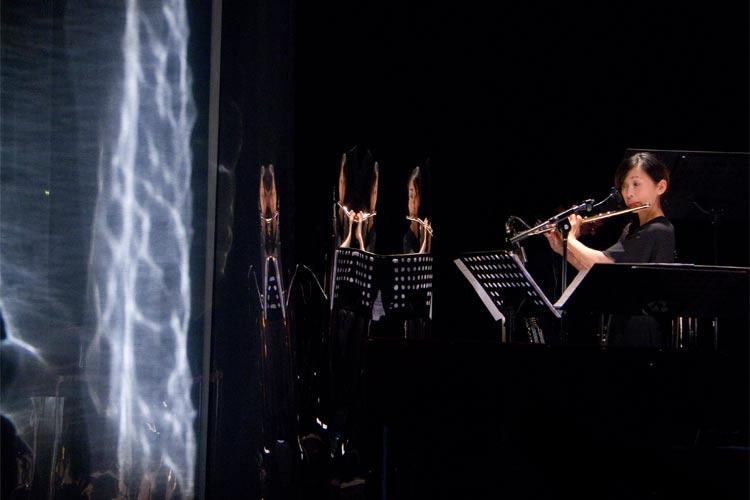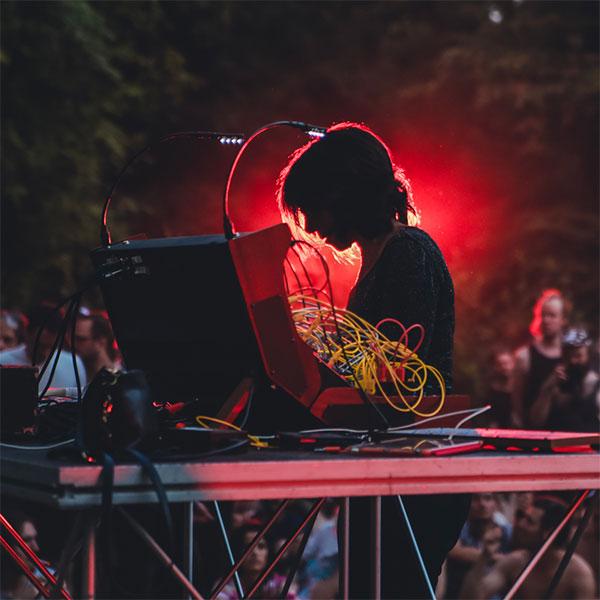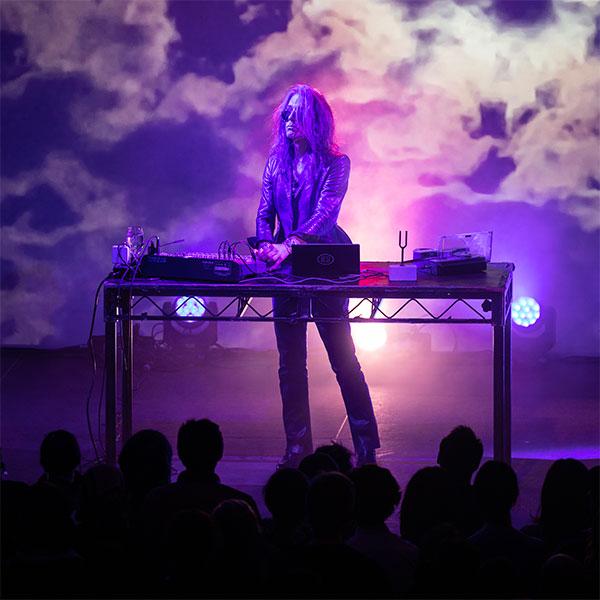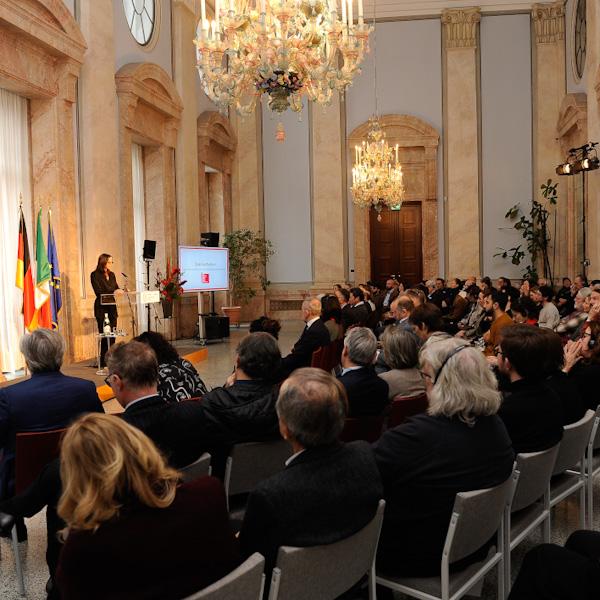A red thread unfurls along the deep furrows of the practices of a tradition that remains vibrant and suffuses the creative paths of many of the most representative authors of that ample region of the Asian continent that embraces China, Korea and Japan. Composers whose relationship with the West has been one of frequentation or even of union.

The Biennale Musica 2017 meets the East
“The theme of the East is an important red thread that binds many of the concerts in the programme”, says Director Ivan Fedele.
Biennale Musica 2017
Scheduled to take place from September 29th to October 8th, the 61st International Festival of Contemporary Music looks out to the Orient this year. "The theme of the Orient is an important red thread that binds many of the concerts in the programme – stated Director Ivan Fedele. A red thread that unfurls along the deep furrows of the practices of a tradition that remains vibrant and suffuses the creative paths of many of the most representative authors of that ample region of the Asian continent that embraces China, Korea and Japan. Authors whose relationship with the West has been one of frequentation or even of union".
East!
The Festival begins with the spiritual journey of Inori (29 September, Teatro alle Tese), imagined by Karlheinz Stockhausen as a great musical prayer for a dancer-mime and orchestra, in which the former's score of gestures, borrowed from the devotional vocabulary of different religions, serves as a sounding environment for the spatialized music of the orchestra. Inori will be performed by the Orchestra di Padova e del Veneto conducted by Marco Angius.
A second concert by the Orchestra from Padua (7 October, Teatro alle Tese), directed by Yoichi Sugiyama, is dedicated entirely to the music of the Far East, in a dialogue between tradition and avant-garde that offers a range of different perspectives. With Chinese composer Guo Wenjing (1956), one of the leading figures – with Tan Dun, Chen Yi, Zhou Long, Chen Qigang and others – of that generation of musicians, known today to the entire world of contemporary music, that blossomed during the Cultural Revolution; and with the new generation of Japanese authors, Malika Kishino (1971) and Dai Fujikura (1977), the winner of the Silver Lion 2017. A native of Osaka but resident in London from a very early age, Fujikura's career has been brilliant and today his music is performed from Caracas to Oslo, Lucerne and Paris, he has won commissions from the finest musical institutions and worked with conductors such as Pierre Boulez, Gustavo Dudamel, and Peter Eötvös.
Tan Dun
The Golden Lion for Lifetime Achievement of the 61st Festival has been awarded to Chinese composer Tan Dun, a long-time resident of New York, and one of the few contemporary music composers to have become a popular phenomenon, with 15 million viewers on You Tube for his Internet Symphony. The Orchestra Sinfonica Nazionale della Rai will perform Secrets of Wind and Birds, The Tears of Nature and Concerto for Orchestra in a concert conducted by Tan Dun himself. Three works that have never been performed in Italy and that express his ideal of organic music "in symbiosis with the environment, in which natural elements such as water, stones, objects made of paper and ceramic interact with the traditional instruments in the orchestra, making him a unique figure in the world of music", as written in the motivation for the award.
Other composers
There is historic depth in the association between Unsuk Chin (1961) and Isang Yun (1917-1995) performed by the Parco della Musica Contemporanea Ensemble conducted by Tonino Battista (1 October, Teatro alle Tese). Both born in South Korea, and later residents in Berlin (though Yun was compelled by historical events), the concert shines a light on the roots and developments of the relationship between East and West, opening a dialogue between Unsuk Chin, an established composer on the international scene, and a key figure such as Isang Yun, one of the first to explore the Oriental tradition, Chinese Taoism and the Western avant-garde from a philosophical and aesthetic perspective.
Born in Hiroshima in 1955, Toshio Hosokawa, to whom the Festival dedicates a portrait spanning over twenty years with the Takefu Ensemble (7 October, Teatro Piccolo Arsenale), bases his music on the principles of Zen Buddhism and a symbolic interpretation of nature, in which sound and silence are equally important, because the notes are born and die like a mounting breath. "Silence is full of sound if only we knew how to listen to it", says Hosokawa, who compares his music to the brushstrokes of a calligrapher, whose artistic gesture begins in the air and only later touches down on the paper.
Europe and beyond
Michele Marco Rossi, Sévérine Ballon and Arne Deforce (3 October, Sala delle Colonne) are the stars of a focus on the cello, another instrument that changes in its experimentation with electronics: the programmes of the three soloists – who will present 8 Italian premieres and 2 world premieres with works by Rebecca Saunders, Chaya Czernowin, Liza Lim, Iannis Xenakis, Sofia Avramidou, Arturo Fuentes, Raphael Cendo, Franck Bedrossian, Richard Barrett, Thierry Blondeau, Gabriele Cosmi, and Lucia Ronchetti - introduce us "to a world of sound that transfigures the familiar sound of an instrument as symbolic of our western tradition as the cello, in a universe of new acoustic dimensions and truly astounding new and original creative approaches" (Ivan Fedele).
Technology and music
Working with devices and technology, on the "vintage" side, are the musicians from Tempo Reale, the Florentine centre for research into sound, with Russian composer Alexander Chernyshkov (1983), author of the original Trascrizione di un errore presented for the Biennale College last year. In this experiment, Chernyshkov "grapples with a musical score that merges the instruments-devices of our everyday life (elevator relays, pin-technology printers, obsolete floppy disks, etc.) with the support of two non-conventional poly-instrumentalists. All within a context that uses the space to break through the concept of the traditional concert in order to create an immersive experience of proximity, which is increasingly essential to the newest emerging electronic music experiences" (Francesco Giomi, Tempo Reale).
Instrumental music, electronics, video, dance and live painting are called into play in the visual performances of the Hanatsu Miroir ensemble, as in La vallée des Merveilles (4 October, Teatro alle Tese), which the composer of the music Maurilio Cacciatore (1981) describes as "a composition halfway between chamber music and theatre that in my opinion defines a new space in contemporary creation", or such as Lost in feedback (5 October, Sale d'Armi), also by Maurilio Cacciatore, in this concert heard with a new creation by Japanese composer Kenji Sakai (1977).


